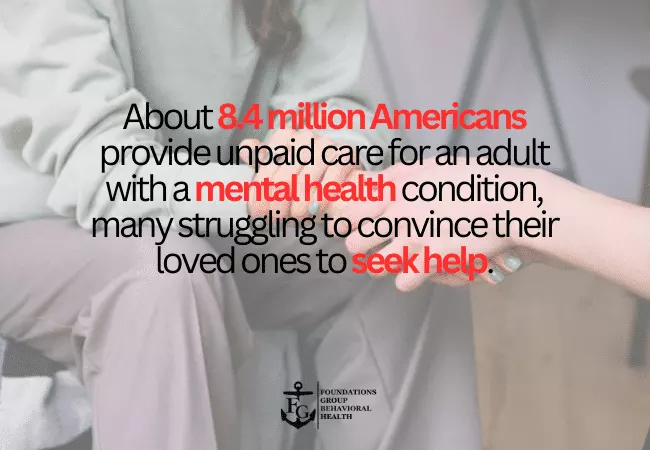Watching someone you care about struggle with their mental health while refusing help can be one of the most difficult experiences. Whether it’s anxiety, depression, bipolar disorder, or co-occurring disorders, untreated mental health challenges can have devastating effects on their overall well-being, relationships, and quality of life. Convincing someone to seek treatment requires patience, understanding, and a strategic approach.
At Foundations Group Behavioral Health, we understand the complexity of this issue and provide comprehensive, compassionate care through programs like our Psychiatric Day Treatment Program, Half Day Treatment Program, and Outpatient Mental Health Program. By equipping yourself with knowledge and strategies, you can help your loved one take that critical first step toward recovery.
Why Do People Refuse Mental Health Help?
The first step in encouraging someone to seek help is understanding the reasons behind their resistance. People refuse mental health treatment for many reasons, including:
- Stigma:
Despite growing awareness, mental health stigma remains a significant barrier. Many individuals fear being judged, labeled as “weak,” or treated differently by others. - Denial:
Mental health challenges often come with a lack of insight. Individuals may downplay their symptoms, believe they are simply “going through a phase,” or deny the problem altogether. - Fear of the Unknown:
Fear of discussing painful emotions, skepticism about therapy, or concerns about taking medications can make individuals hesitant to seek treatment. - Negative Past Experiences:
A previous bad experience with a therapist or mental health provider can leave someone distrustful of the mental health system. - Logistical Barriers:
Concerns about the cost of treatment, lack of time, transportation, or availability of services can discourage individuals from seeking help.
Understanding these barriers helps you address their concerns effectively and tailor your approach to their specific situation.
Signs That Someone Needs Mental Health Help
Recognizing the signs of mental health struggles in a loved one is the first step in helping them get the support they need. While everyone experiences emotional ups and downs, persistent or worsening symptoms may indicate the need for professional mental health care. Here are key signs to watch for:
1. Emotional Symptoms
- Persistent Sadness or Hopelessness: A constant low mood, feelings of despair, or a sense of worthlessness that doesn’t improve over time.
- Irritability or Mood Swings: Sudden or extreme changes in mood, including anger or frustration over minor issues.
- Anxiety or Fear: Intense worry, fear, or panic attacks that interfere with daily life.
2. Behavioral Symptoms
- Social Withdrawal: Avoiding friends, family, or activities they once enjoyed.
- Reckless Behavior: Engaging in risky activities or showing a lack of concern for personal safety.
- Substance Use: Increasing reliance on drugs or alcohol to cope with emotions or stress.
3. Cognitive Symptoms
- Difficulty Concentrating: Trouble focusing on tasks, making decisions, or remembering important details.
- Negative Thought Patterns: Persistent self-criticism, hopelessness about the future, or thoughts of self-harm.
4. Physical Symptoms
- Changes in Sleep or Appetite: Insomnia, oversleeping, or significant changes in eating habits (overeating or loss of appetite).
- Unexplained Aches and Pains: Chronic physical symptoms, such as headaches or stomach problems, without a clear medical cause.
5. Functional Decline
Neglecting Responsibilities: Difficulty managing daily tasks, such as paying bills or maintaining a home.
Work or School Performance: Declining productivity, missed deadlines, or frequent absences.
How to Encourage Someone to Seek Mental Health Treatment
Convincing someone to seek help requires patience, empathy, and careful communication. Here are detailed strategies to guide you:
1. Approach the Conversation with Compassion
Timing and tone are critical when addressing mental health concerns. Choose a private, calm setting where you can talk without distractions. Speak from a place of love and concern rather than judgment. Use “I” statements to express how you feel and avoid placing blame.
Example:
- “I’ve noticed you’ve seemed really down lately, and I’m worried about you. I want to support you in any way I can.”
2. Provide Education and Information
Sometimes, resistance stems from a lack of understanding about mental health or the treatment process. Educate your loved one about their symptoms and share information about evidence-based treatments, such as a Depressive Disorder Treatment Program or an Anxiety Treatment Program.
Explain that seeking help doesn’t mean they’re weak—it’s a courageous step toward feeling better. Highlight options like therapy or Outpatient Mental Health Programs, which allow flexibility and privacy.
3. Be Supportive, Not Pushy
Avoid ultimatums or pressure tactics, as these can make someone defensive. Instead, offer your support in practical ways:
- Help them research providers or treatment options.
- Offer to accompany them to their first appointment.
- Provide reassurance that you’ll be there throughout the process.
4. Address Their Concerns
If they express fears about treatment, listen without judgment and address their concerns directly:
- If they fear stigma, emphasize confidentiality in therapy.
- If they’re worried about time, suggest flexible options like our Half Day Treatment Program or Outpatient Mental Health Program.
- If cost is an issue, help them explore insurance coverage or local resources.
5. Involve Trusted People
Sometimes, hearing the same concerns from multiple people can encourage someone to take action. Consider involving trusted friends, family members, or even a doctor they respect to reinforce the importance of seeking help.
6. Set Healthy Boundaries
While it’s important to offer support, your own mental health matters too. If their refusal to seek help begins to harm you emotionally, set clear boundaries while continuing to encourage treatment.
When Resistance Persists: Additional Steps
When a loved one refuses mental health help despite clear signs of distress, it can be frustrating and emotionally draining. If initial attempts to encourage them to seek treatment fail, consider these additional steps:
1. Consult a Mental Health Professional
Reach out to a mental health provider for guidance. Many professionals offer consultations for concerned family members, helping you develop strategies to address resistance. They can provide insights into the best way to communicate with your loved one and suggest next steps.
2. Start with Small Steps
If full-fledged treatment feels overwhelming, suggest starting small. For example:
- Attending one therapy session to “test the waters.”
- Participating in a support group.
- Exploring outpatient options like the Outpatient Mental Health Program at Foundations Group Behavioral Health, which allows flexibility while providing necessary support.
3. Highlight the Benefits
Emphasize how treatment can improve their quality of life rather than focusing on their current struggles. Share success stories, explain how therapies like those in a Depressive Disorder Treatment Program or Anxiety Treatment Program have helped others, and address their specific concerns about treatment.
4. Involve a Trusted Third Party
Sometimes, hearing concerns from a trusted family member, friend, or authority figure can make a difference. This person might help reinforce the importance of seeking help and provide additional support.
5. Prepare for Crisis Intervention
If your loved one’s mental health deteriorates to the point where they pose a danger to themselves or others, you may need to act decisively. This could involve:
- Calling a crisis hotline or emergency services.
- Taking them to the nearest behavioral health center for immediate care.
While this step may feel drastic, ensuring their safety is the top priority.

Treatment Options at Foundations Group Behavioral Health
At Foundations Group Behavioral Health, we provide a range of programs to support individuals at every stage of their mental health journey:
- Psychiatric Day Treatment Program: Intensive, structured care for individuals needing focused therapeutic interventions during the day.
- Half Day Treatment Program: A flexible option that balances therapy with daily responsibilities.
- Outpatient Mental Health Program: Ongoing support for individuals managing work, school, or family while addressing their mental health.
- Anxiety Treatment Program: Tailored strategies for managing chronic worry, fear, or panic.
- Depressive Disorder Treatment Program: Evidence-based therapies for overcoming persistent sadness, hopelessness, and fatigue.
- Bipolar Disorder Treatment Program: Stabilization and support for individuals experiencing mood instability.
- Co-Occurring Disorder Treatment Program: Integrated care for individuals facing mental health challenges and substance use disorders.
Why Early Intervention Matters
Early intervention in mental health care is crucial for preventing conditions from worsening and improving long-term outcomes. Addressing mental health challenges at their onset can lead to better symptom management, faster recovery, and a higher quality of life.
1. Prevents Symptoms from Escalating
Mental health conditions like anxiety, depression, or bipolar disorder tend to worsen over time without treatment. Early intervention can prevent the progression of symptoms and reduce the risk of co-occurring disorders, such as substance use.
2. Improves Relationships
Mental health challenges often strain relationships with family, friends, and coworkers. Early treatment can help individuals rebuild emotional connections and improve communication skills, fostering healthier relationships.
3. Enhances Physical Health
Chronic stress and untreated mental health conditions are linked to physical health problems, including heart disease, obesity, and weakened immune function. Seeking treatment early reduces this burden, promoting overall well-being.
4. Increases Chances of Recovery
Research shows that individuals who receive early mental health care experience better outcomes. Programs like our Psychiatric Day Treatment Program or Half Day Treatment Program provide structured support to help individuals regain stability and achieve lasting recovery.
5. Builds Resilience
Therapy and mental health programs equip individuals with tools to manage stress, navigate challenges, and build resilience. This foundation not only aids in recovery but also helps prevent future episodes of mental health decline.
6. Reduces the Risk of Crisis
By addressing issues early, individuals are less likely to reach a breaking point that requires emergency intervention. Early care can prevent self-harm, suicidal ideation, or severe functional decline.
The Role of Foundations Group Behavioral Health in Early Intervention
At Foundations Group Behavioral Health, we offer a range of programs tailored to meet the needs of individuals at every stage of their mental health journey. Whether someone requires intensive care through our Psychiatric Day Treatment Program, flexible support via the Half Day Treatment Program, or ongoing therapy through our Outpatient Mental Health Program, our multidisciplinary team is here to help.
By addressing mental health challenges proactively, we empower individuals to reclaim their lives and build a brighter future. If you or a loved one is struggling, contact us today to learn how our comprehensive programs can make a difference.
Take Action Today
Helping someone get mental health help when they refuse is a challenging process, but you don’t have to navigate it alone. At Foundations Group Behavioral Health, we provide compassionate care and support for individuals and their families.
Contact us today to learn more about our programs and how we can help your loved one take the first step toward healing and recovery. Together, we can make a difference. Call us at 888.685.9730 to start your journey to a mindful future.
FAQ on Mental Health Help
What are common reasons people refuse mental health help?
People may refuse mental health help due to stigma, denial of their condition, fear of treatment, negative past experiences, or logistical barriers like cost or time constraints.
How can I recognize if someone needs mental health treatment?
Signs include persistent sadness, anxiety, mood swings, social withdrawal, changes in sleep or appetite, difficulty concentrating, reckless behavior, and a decline in daily functioning.
What should I do if someone refuses mental health help?
Approach the conversation with empathy, educate them about their options, offer support, address their concerns, and involve trusted friends or family if necessary.
What are small steps someone can take toward treatment?
Starting with a single therapy session, joining a support group, or enrolling in a less intensive program like an Outpatient Mental Health Program can help them ease into treatment.
What if their refusal puts them in danger?
If someone poses a risk to themselves or others, contact a crisis hotline or take them to an emergency room for immediate intervention.
Why is early intervention in mental health important?
Early intervention prevents symptoms from worsening, improves treatment outcomes, strengthens relationships, and reduces the risk of co-occurring disorders or crises.
What treatment options are available at Foundations Group Behavioral Health?
We offer comprehensive care, including a Psychiatric Day Treatment Program, Half Day Treatment Program, Outpatient Mental Health Program, Depressive Disorder Treatment Program, Anxiety Treatment Program, Bipolar Disorder Treatment Program, and Co-Occurring Disorder Treatment Program.








